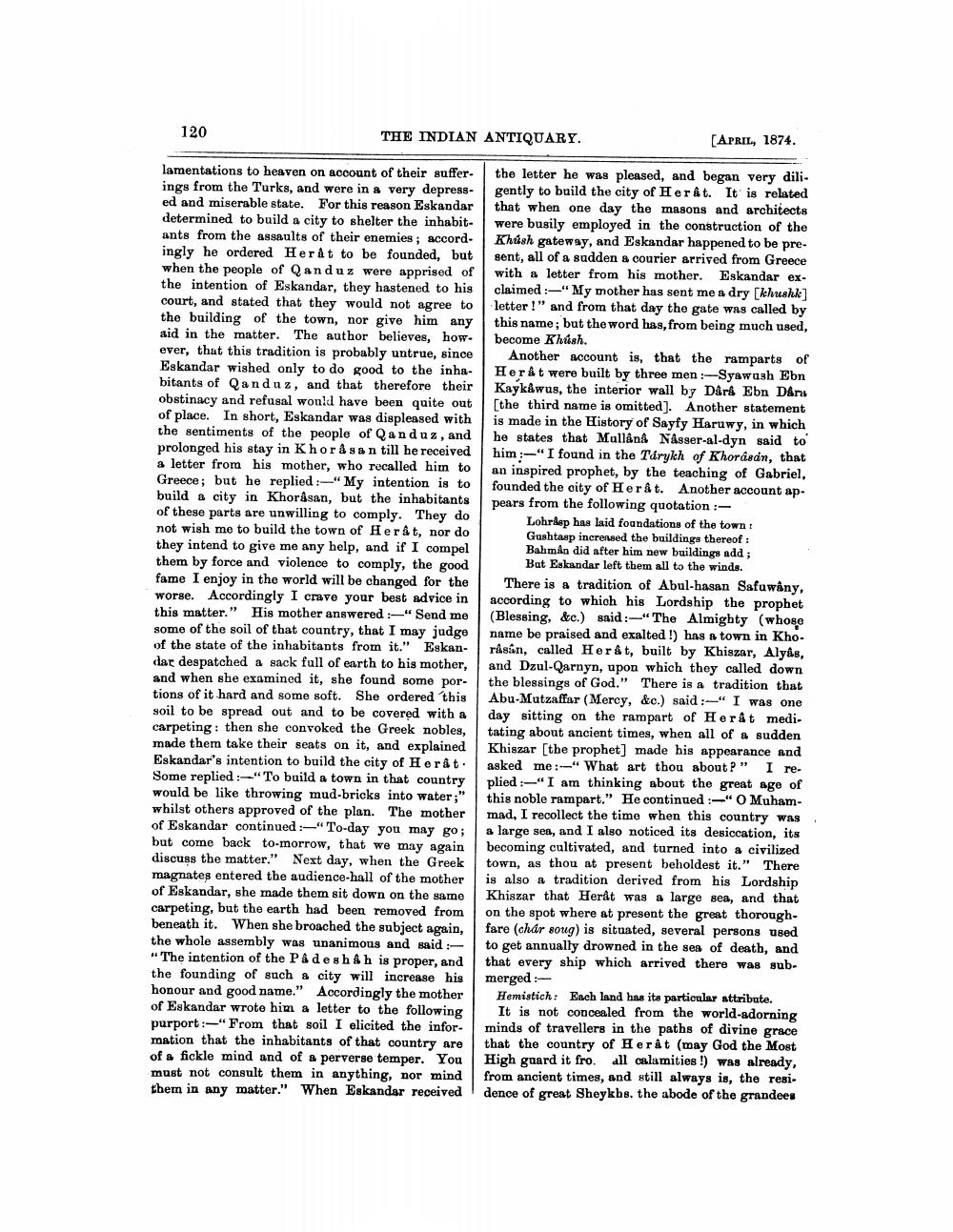________________
120
THE INDIAN ANTIQUARY.
lamentations to heaven on account of their sufferings from the Turks, and were in a very depressed and miserable state. For this reason Eskandar determined to build a city to shelter the inhabitants from the assaults of their enemies; accordingly he ordered Herât to be founded, but when the people of Qanduz were apprised of the intention of Eskandar, they hastened to his court, and stated that they would not agree to the building of the town, nor give him any aid in the matter. The author believes, however, that this tradition is probably untrue, since Eskandar wished only to do good to the inhabitants of Qanduz, and that therefore their obstinacy and refusal would have been quite out of place. In short, Eskandar was displeased with the sentiments of the people of Qanduz, and prolonged his stay in Khorasan till he received a letter from his mother, who recalled him to Greece; but he replied:-"My intention is to build a city in Khorasan, but the inhabitants of these parts are unwilling to comply. They do not wish me to build the town of Herât, nor do they intend to give me any help, and if I compel them by force and violence to comply, the good fame I enjoy in the world will be changed for the worse. Accordingly I crave your best advice in this matter." His mother answered:-"Send me some of the soil of that country, that I may judge. of the state of the inhabitants from it." Eskandar despatched a sack full of earth to his mother, and when she examined it, she found some portions of it hard and some soft. She ordered this soil to be spread out and to be covered with a carpeting: then she convoked the Greek nobles, made them take their seats on it, and explained Eskandar's intention to build the city of Heråt. Some replied:"To build a town in that country would be like throwing mud-bricks into water;" whilst others approved of the plan. The mother of Eskandar continued:-"To-day you may go; but come back to-morrow, that we may again discuss the matter." Next day, when the Greek magnates entered the audience-hall of the mother of Eskandar, she made them sit down on the same carpeting, but the earth had been removed from beneath it. When she broached the subject again, the whole assembly was unanimous and said: "The intention of the På desh&h is proper, and the founding of such a city will increase his honour and good name." Accordingly the mother of Eskandar wrote him a letter to the following purport:-"From that soil I elicited the information that the inhabitants of that country are of a fickle mind and of a perverse temper. You must not consult them in anything, nor mind them in any matter." When Eskandar received
[APRIL, 1874.
the letter he was pleased, and began very diligently to build the city of Herât. It is related that when one day the masons and architects were busily employed in the construction of the Khush gateway, and Eskandar happened to be present, all of a sudden a courier arrived from Greece with a letter from his mother. Eskandar exclaimed:-"My mother has sent me a dry [khushk] letter!" and from that day the gate was called by this name; but the word has, from being much used, become Khush.
Another account is, that the ramparts of Her&t were built by three men :-Syawush Ebn Kayk&wus, the interior wall by Dârâ Ebn Dâr [the third name is omitted]. Another statement is made in the History of Sayfy Haruwy, in which he states that Mullânâ Nâsser-al-dyn said to him:-"I found in the Tárykh of Khorásán, that an inspired prophet, by the teaching of Gabriel, founded the city of Herât. Another account appears from the following quotation:
Lohriep has laid foundations of the town: Gushtasp increased the buildings thereof: Bahman did after him new buildings add; But Eskandar left them all to the winds. There is a tradition of Abul-hasan Safuwany, according to which his Lordship the prophet (Blessing, &c.) said:-"The Almighty (whose name be praised and exalted!) has a town in Khorâsân, called Heråt, built by Khiszar, Alyâs, and Dzul-Qarnyn, upon which they called down the blessings of God." There is a tradition that Abu-Mutzaffar (Mercy, &c.) said:" I was one day sitting on the rampart of Herât meditating about ancient times, when all of a sudden Khiszar [the prophet] made his appearance and asked me:"What art thou about?" I replied: "I am thinking about the great age of this noble rampart." He continued:-" O Muhammad, I recollect the time when this country was a large sea, and I also noticed its desiccation, its becoming cultivated, and turned into a civilized town, as thou at present beholdest it." There is also a tradition derived from his Lordship Khiszar that Herât was a large sea, and that on the spot where at present the great thoroughfare (chár soug) is situated, several persons used to get annually drowned in the sea of death, and that every ship which arrived there was submerged:
Hemistich: Each land has its particular attribute. It is not concealed from the world-adorning minds of travellers in the paths of divine grace that the country of Herât (may God the Most High guard it fro. all calamities!) was already, from ancient times, and still always is, the residence of great Sheykhs. the abode of the grandees




